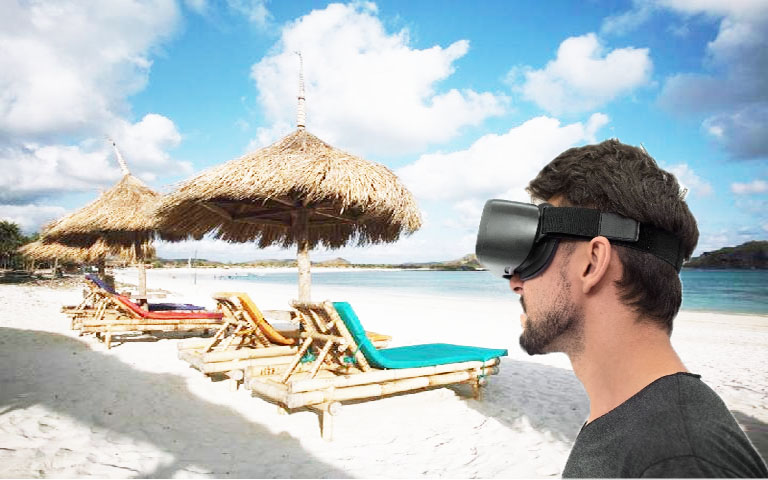Perhaps, the travel and tourism industry suffered the strongest blow of COVID-19 as countries still remain closed to tourism. Little did we know that the travel ban was going to be prolonged for an unpredictable period. The disruption in travel caused by the pandemic has brought Virtual Tourism to the forefront.
What seemed like a wait for 1-2 months before one could travel again, found people locked up within their houses for months. The urge to travel again is rising as people are seeking distractions and an escape from the routine life. However, with not much choice, people are finally stepping into the world of digital tourism. As the travel industry continues to recover from the crisis with innovative ways, let’s understand what virtual tourism is and how it will transform the concept of travel.
What is Virtual Tourism?
Traditionally, virtual tourism was used mainly as a marketing tool that leverages augmented reality and virtual reality. Virtual tourism essentially enabled armchair travelers to have travel experiences of new destinations without leaving their homes.
In the wake of the coronavirus pandemic, virtual reality tourism has gained significance and popularity in offering virtual tours of different attractions from home. Linked with the concept of smart tourism and driven by technological developments, virtual tourism is gaining momentum in the travel and tourism industry.
As a virtual tourist, you will have the option to choose the vibe of the place, the pace of events, and the period of time you want to experience it for. There are numerous options that Virtual tourism offer, from short videos to experiences that last as long as you want.
You can visit museums, galleries, try skyline webcams, take remote-control tours, and do so much more without having to travel physically.
What are the benefits of virtual tourism for travelers?
The VR technology enables travelers to experience attractions and other important aspects of a destination before they physically visit that destination. Taking virtual tours of hotels and attractions can help travelers choose the right places to stay and visit. SInce travelers can virtually visit attractions, trip planning gets a lot easier as well. For instance, you can plan what to pack while visiting a certain attraction or staying at a hotel.
One of the greatest benefits of virtual tourism is for people who don’t have the savings to visit a destination or don’t like to travel but would like to experience new destinations. Such travelers can visit different places virtually without having to travel physically and spend on plane tickets, hotels, food, attractions, etc.
What are the benefits of virtual tourism for business?
While virtual tourism offers various benefits to travelers, it is also lucrative for businesses in the travel and hospitality industries. For instance, Hoteling software can leverage VR technology to offer immersive tours of the property, rooms, lounge areas, and other amenities. Businesses can share these tours on different platforms to attract travelers and help them make informed decisions. Virtual tourism can help businesses gain competitive advantage in their industry by standing out in the virtual space.
What’s unique about virtual tourism?
Is there an attraction you really wanted to see but it doesn’t exist anymore? There are many such attractions like the Great Barrier Reef in Australia and the 12 Apostles in Great Ocean Road, to name a few, that are depleting rapidly. After a point in time, it would be impossible to experience these attractions physically. This is where virtual tourism comes in and steals the show.
With virtual tourism time travel is possible, although virtually. It gives you an opportunity to visit a destination or an attraction that may not be possible physically or in the real world. Virtual tourism opens up attractions from the past that have been reconstructed exclusively for VR technology. So, virtual tourism offers something that even real-time physical traveling may not offer.
Moreover, you can easily visit places that may not otherwise be safe to visit physically. The environment of some places may be extreme due to which many travelers can’t experience the place, but virtual tourism knows no boundaries in such cases. With the help of virtual reality technology, you can visit any country irrespective of its political situations, visa restrictions, and dangerous activities.
The Future of Virtual Tourism
While many believe that nothing can replace the real-time and physical travel experience, we are yet to experience how virtual tourism can offer us the closest experience to a real one. The travel industry will certainly resume normal operations, but no one is certain about the time when that will happen. You can check for a Travel app development company for perfect virtual tourism.
Therefore, digital tourism is probably the most viable alternative while countries are still in lockdown.
Virtual tourism may seem to be a temporary trend as every individual is prying physical travel. But, the VR technology has immense potential to redefine future travel with virtual tourism. In the future, it may be still considered as a viable replacement to real travel for people who are unable to travel or are short on budget.










